Resources
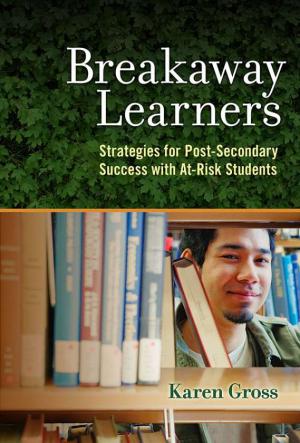
Click Here for Book Review This powerful book explores how institutions of higher education can successfully serve “breakaway” students—first-generation, low-income students who are trying to break away from the past in order to create a more secure future. The gap between low-SES and high-SES students persists as efforts to close it have not met with great success. In this provocative book, Gross offers a new approach to addressing inequities by focusing on students who have succeeded despite struggling with the impacts of poverty and trauma. Gross draws on her experience as a college president to outline practical steps that postsecondary institutions can take to create structures of support and opportunity that build reciprocal trust. Students must trust their institutions and professors, professors must trust their students, and eventually students must learn to trust themselves. Visit the book’s website at breakawaylearners.com.(From the Publisher)
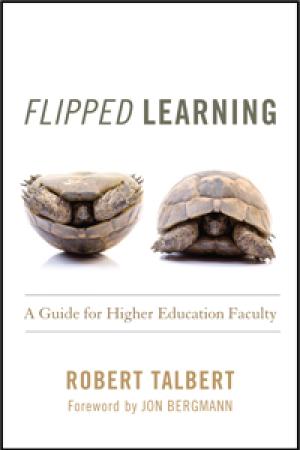
Click Here for Book Review Flipped learning is an approach to the design and instruction of classes through which, with appropriate guidance, students gain their first exposure to new concepts and material prior to class, thus freeing up time during class for the activities where students typically need the most help, such as applications of the basic material and engaging in deeper discussions and creative work with it. While flipped learning has generated a great deal of excitement, given the evidence demonstrating its potential to transform students’ learning, engagement and metacognitive skills, there has up to now been no comprehensive guide to using this teaching approach in higher education. Robert Talbert, who has close to a decade’s experience using flipped learning for majors in his discipline, in general education courses, in large and small sections, as well as online courses – and is a frequent workshop presenter and speaker on the topic – offers faculty a practical, step-by-step, “how-to” to this powerful teaching method. He addresses readers who want to explore this approach to teaching, those who have recently embarked on it, as well as experienced practitioners, balancing an account of research on flipped learning and its theoretical bases, with course design concepts to guide them set up courses to use flipped learning effectively, tips and case studies of actual classes across various disciplines, and practical considerations such as obtaining buy-in from students, and getting students to do the pre-class activities. This book is for anyone seeking ways to get students to better learn the content of their course, take more responsibility for their work, become more self-regulated as learners, work harder and smarter during class time, and engage positively with course material. As a teaching method, flipped learning becomes demonstrably more powerful when adopted across departments. It is an idea that offers the promise of transforming teaching in higher education. (From the Publisher)
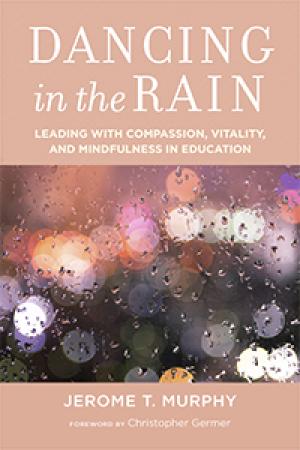
Click Here for Book Review Dancing in the Rain offers a lively and accessible guide aimed at helping education leaders thrive under pressure by developing the inner strengths of mindfulness and self-compassion, expressing emotions wisely, and maintaining a clear focus on the values that matter most. Jerome T. Murphy, a scholar and former dean who has written and taught about the inner life of education leaders, argues that the main barrier to thriving as leaders is not the outside pressures we face, but how we respond to them inside our minds and hearts. In this concise volume, Murphy draws on a combination of Eastern contemplative traditions and Western psychology, as well as his own experience and research in the field of education leadership. He presents a series of exercises and activities to help educators take discomfort more in stride, savor the joys and satisfactions of leadership work, and thrive as effective leaders guided by heartfelt values. Every day, education leaders find themselves swamped in a maelstrom of pressures that add to the complex challenges of educating all students to a high level. With humor and compassion, Dancing in the Rain shows educators how to lead lives of consequence and purpose in the face of life’s inescapable downpours. (From the Publisher)
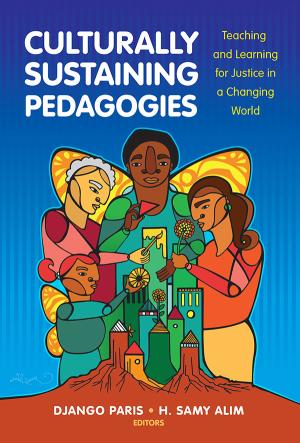
Culturally Sustaining Pedagogies raises fundamental questions about the purpose of schooling in changing societies. Bringing together an intergenerational group of prominent educators and researchers, this volume engages and extends the concept of culturally sustaining pedagogy (CSP)—teaching that perpetuates and fosters linguistic, literate, and cultural pluralism as part of schooling for positive social transformation. The authors propose that schooling should be a site for sustaining the cultural practices of communities of color, rather than eradicating them. Chapters present theoretically grounded examples of how educators and scholars can support Black, Indigenous, Latinx, Asian/Pacific Islander, South African, and immigrant students as part of a collective movement towards educational justice in a changing world. (From the Publisher)
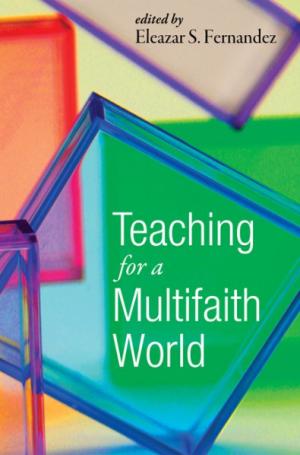
Click Here for Book Review When religious diversity is our reality, radical hospitality to people of other faiths is not a luxury but a necessity. More than necessary for our survival, radical hospitality to religious diversity is necessary if we are to thrive as a global society. By no means does the practice of hospitality in a multifaith world require that we be oblivious of our differences. On the contrary, it demands a respectful embrace of our differences because that's who we are. Neither does radical hospitality require that we water down our commitment, because faithfulness and openness are not contradictory. We must be able to say with burning passion that we are open to the claims of other faiths because we are faithful to our religious heritage. The essays in this book do not offer simply theological exhortations; they offer specific ways of how we can become religiously competent citizens in a multifaith world. Let's take the bold steps of radical openness with this book on our side! (From the Publisher)
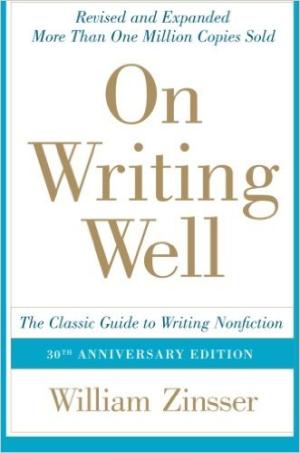
On Writing Well has been praised for its sound advice, its clarity and the warmth of its style. It is a book for everybody who wants to learn how to write or who needs to do some writing to get through the day, as almost everybody does in the age of e-mail and the Internet. Whether you want to write about people or places, science and technology, business, sports, the arts or about yourself in the increasingly popular memoir genre, On Writing Well offers you fundamental priciples as well as the insights of a distinguished writer and teacher. With more than a million copies sold, this volume has stood the test of time and remains a valuable resource for writers and would-be writers. (From the Publisher)

Writing is a solitary sport—but none of us can do it without good company at crucial moments. This spirited collection of inspiring and useful essays and exercises on the craft of writing is the next best thing to having an experienced writer at your side. These twenty-nine pieces, more than half of which have never been published in book form, include selections as unusual and diverse as behaviorist B. F. Skinner's "How to Discover What You Have to Say"; Brett Candlish Millier's investigation of the seventeen drafts of Elizabeth Bishop's poem "One Art"; Ursula Le Guin's "Where Do You Get Your Ideas From?"; Anne Eisenberg's "E-Mail and the New Epistolary Age"; and Nancy Mair's "The Writer's Thin Skin and Faint Heart." Other contributors include Gloria Naylor, Stanley Kunitz, Bernard Shaw, Natalie Goldberg, Anne Tyler, Rita Dove, Peter Elbow, and Gail Godwin. (From the Publisher)
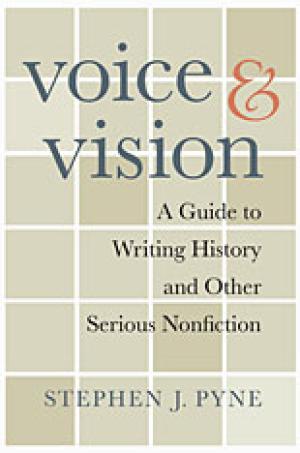
It has become commonplace these days to speak of “unpacking” texts. Voice and Vision is a book about packing that prose in the first place. While history is scholarship, it is also art—that is, literature. And while it has no need to emulate fiction, slump into memoir, or become self-referential text, its composition does need to be conscious and informed. Voice and Vision is for those who wish to understand the ways in which literary considerations can enhance nonfiction writing. At issue is not whether writing is scholarly or popular, narrative or analytical, but whether it is good. Fiction has guidebooks galore; journalism has shelves stocked with manuals; certain hybrids such as creative nonfiction and the new journalism have evolved standards, esthetics, and justifications for how to transfer the dominant modes of fiction to topics in nonfiction. But history and other serious or scholarly nonfiction have nothing comparable. Now this curious omission is addressed by Stephen Pyne as he analyzes and teaches the craft that undergirds whole realms of nonfiction and book-based academic disciplines. With eminent good sense concerning the unique problems posed by research-based writing and with a wealth of examples from accomplished writers, Pyne, an experienced and skilled writer himself, explores the many ways to understand what makes good nonfiction, and explains how to achieve it. His counsel and guidance will be invaluable to experts as well as novices in the art of writing serious and scholarly nonfiction. (From the Publisher)
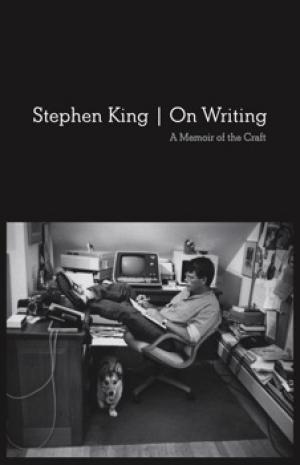
Immensely helpful and illuminating to any aspiring writer, this special edition of Stephen King’s critically lauded, million-copy bestseller shares the experiences, habits, and convictions that have shaped him and his work. “Long live the King” hailed Entertainment Weekly upon publication of Stephen King’s On Writing. Part memoir, part master class by one of the bestselling authors of all time, this superb volume is a revealing and practical view of the writer’s craft, comprising the basic tools of the trade every writer must have. King’s advice is grounded in his vivid memories from childhood through his emergence as a writer, from his struggling early career to his widely reported, near-fatal accident in 1999—and how the inextricable link between writing and living spurred his recovery. Brilliantly structured, friendly and inspiring, On Writing will empower and entertain everyone who reads it—fans, writers, and anyone who loves a great story well told. (From the Publisher)
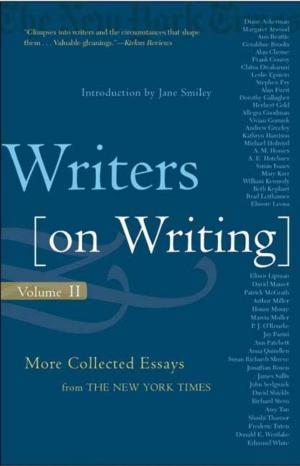
In a second volume of original essays drawn from the long-running New York Times column, Writers on Writing brings together another group of contemporary literature's finest voices to muse on the challenges and gifts of language and creativity. The pieces range from taciturn, hilarious advice for aspiring writers to thoughtful, soul-wrenching reflections on writing in the midst of national tragedy. William Kennedy talks about the intersecting lives of real and imagined Albany politics; Susan Isaacs reveals her nostalgia for a long-retired protagonist; and Elmore Leonard offers pithy rules for letting the writing, and not the writer, take charge. With contributions from Diane Ackerman, Margaret Atwood, Frank Conroy, Mary Karr, Patrick McGrath, Arthur Miller, Amy Tan, and Edmund White, Writers on Writing, Volume II offers an uncommon and revealing view of the writer's world. (From the Publisher)